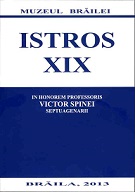Relevanţa scrierii Vita Karoli Magni a lui Einhard pentru istoria balcanică
The Importance of Einhard’s Vita Karoli Magni for the History of the Balkans
Author(s): Tudor TeoteoiSubject(s): History
Published by: EDITURA ISTROS A MUZEULUI BRĂILEI „CAROL I”
Keywords: acroama; Carolingian Renaissance; descensus; domnus (= dominus); gens Francia; magnanimitas = megalopsychia; miracula et prodigia; patrius; peregrinus
Summary/Abstract: A contemporary of Walahfrid Strabo, to whom we are greatly indebted for the precious accounts about the “Tomitan Scythians”, Einhard (≈ 770 - 840) offers in his Vita Karoli Magni numerous information which is also important for the history of the Balkans, like the linguistic unity of Germanic as well as Slavic people, whom he names nations, or gentes. As a representative of the Carolingian Renaissance, Einhard admired antique culture, primarily the Latin language, which he used in a “decent and reasonable” way (decenter aut commode), calling himself homo barbarus by virtue of his Germanic origin, whose “forefather language” (sermo patrius) was Germanic. The “Frankish garments” are designated in a similar fashion as vestitus patrius, to distinguish from “foreign” Roman ones (peregrina indumenta), subject to Latin tradition, namely the “Roman custom” (Romano more), as Eginhard states. The Byzantine emperors were “Roman” (Romani imperatores) as well for him, but equally “Greek” (Graecorum imperatores) or Constantinopolitan (imperatores Constantinopolitani). Charlemagne, “my lord and protector” (dominus et nutritor meus), was instead merely Emperor of the West in this context. His successors in the West would gradually evolve into “emperors of the Romans”, which was fully achieved in the age of the Crusades, while the Byzantine basileis would be reduced for the Western chroniclers into “emperors of the Greeks” or “Constantinopolitans”. Charlemagne is “dominus” for Einhard, which calls him domnus only once. This form originating in common Latin is also present in other sources from the Middle Age. This form is also attested in the Balkan Peninsula – area of emergence for the Eastern Romanity – by St. Domnus, whose cult is also mentioned in “De administrando imperio” of Constantine Porphyrogennetos (10th century). This fact is a confirmation of the opinion, which I also presented in other studies, that the Romanian word “domn” rather traces its origin in the form domnus of common Latin, rather than the more pure “dominus”. Einhard refers to a horse riding accident of the emperor among the omens (prodigia) of Charlemagne’s death. The episode has equivalents in the Serbian and Bulgarian Middle Ages. The accident should be put in connection to a very natural and ubiquitous act in the era of medieval knights. We’re talking about dismounting (Romanian “descälecat”), a term the medieval Latin chronicles call descensus, also relevant for the founding of the two Romanian medieval states. Einhard’s text is extremely valuable and an evidence for the practice of joint ruling, which was transmitted by the Roman Empire to both Byzantium and the Western world of the Middle Ages, and by this filiation further to other Christian societies of those times, the Romanian one counting among these.
Journal: ISTROS
- Issue Year: 19/2013
- Issue No: 1
- Page Range: 413-467
- Page Count: 55
- Language: English
- Content File-PDF

